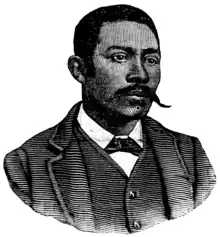Jesse Duke
Jesse Chisholm Duke (March 7, 1853 – January 23, 1916) was a religious and political leader in Alabama who established and edited the Baptist Montgomery Herald newspaper and served as a Selma University trustee.[1] He advocated for civil rights for African Americans.[2]
Jesse Duke | |
|---|---|
 | |
| Born | Jesse Chisholm Duke March 7, 1853 |
| Died | January 23, 1916 (aged 62) |
| Nationality | American |
| Other names | J. C. Duke |
| Occupation(s) | Editor, publisher, activist |
Biography
Duke was born into slavery in March 1853 and raised on a plantation near Cahaba, Alabama. At the age of 10 he was hired as a servant to a family of French refugees. The eldest daughter taught school, giving Jesse his first education.[3] In the 1870s he owned a grocery store and was a teacher.[4] He established the Herald in the 1880s.[5] Duke was an influential political leader among Republicans.[6]
He wrote an anti-lynching article that called out white journalists for turning a blind to the children fathered by white men and African American women, drawing a strong reaction that instigated Duke fleeing with his family to Pine Bluff, Arkansas where he started another newspaper.[7] Local whites held a public meeting and condemned him as a vile and dangerous character after he published a statement about the growing appreciation a white "Juliet" could have for a "colored Romeo".[6]
Duke condemned biased all-white juries and the convict labor system it supplied.[8] He corresponded with Booker T. Washington about relocating the Lincoln School in Marion to Montgomery.[9]
He led the Alabama Colored Press Association during its establishment.[4]
Architect and engineer Charles Sumner Duke (1879–1952) was his son.[7]
The Library of Congress has the Montgomery Herald 1886 to 1887 in its collection.[10]
References
- Harvey, Paul (November 9, 2000). Redeeming the South: Religious Cultures and Racial Identities Among Southern Baptists, 1865–1925. Univ of North Carolina Press. ISBN 978-0-8078-6195-0 – via Google Books.
- Jones, Allen W. (July 1, 1979). "The Black Press in The "New South": Jesse C. Duke's Struggle for Justice and Equality". The Journal of Negro History. 64 (3): 215–228. doi:10.2307/2717034. JSTOR 2717034. S2CID 150173844 – via journals.uchicago.edu (Atypon).
- "Jesse C. Duke". The Appeal. June 27, 1890. p. 1. Retrieved April 24, 2021 – via Chronicling America. (Also LCCN sn83016810.)
- Wells, Jonathan Daniel (October 24, 2011). Women Writers and Journalists in the Nineteenth-Century South. Cambridge University Press. ISBN 978-1-139-50349-5 – via Google Books.
- Nerone, John C.; PhD, Associate Professor of Communications John Nerone (January 2, 1994). Violence Against the Press: Policing the Public Sphere in U.S. History. Oxford University Press. ISBN 978-0-19-508698-0 – via Google Books.
- Hodes, Martha Elizabeth (January 2, 1997). White Women, Black Men: Illicit Sex in the Nineteenth-century South. Yale University Press. ISBN 0-300-07750-5 – via Google Books.
- "Encyclopedia of Arkansas". Encyclopedia of Arkansas.
- Hill, N. C. ) Southern Conference on Women's History 1991 (Chapel (January 2, 1994). Hidden Histories of Women in the New South. University of Missouri Press. ISBN 978-0-8262-0958-0 – via Google Books.
- Washington, Booker T.; Harlan, Louis R.; Harlan, Louis R. (October 31, 1972). Booker T. Washington Papers Volume 2: 1860–89. Assistant Editors, Pete Daniel, Stuart B. Kaufman, Raymond W. Smock, and William M. Welty. University of Illinois Press. ISBN 978-0-252-00243-4 – via Google Books.
- "The Herald (Montgomery, Ala.) 1886–1887". Library of Congress.